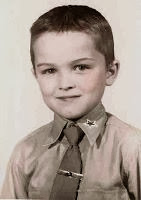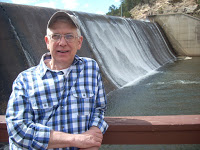I never met my father’s father, John Leonard Nelson. He died when my father, John Archie Nelson, was only 9 years old. As the oldest of six siblings (2 girls and 4 boys), he became the “man-of-the-house” and had to help his mother, Emma Sophia (Ungar) Nelson, support the family. He ultimately left school after the 8th grade to work full-time. Emma was a short but not frail woman. After I was born, she lived with us in Redondo Beach and Lawndale for awhile. During that time she would dress me like mothers did back in the early 1900’s; in clothes that looked like small girl dresses. I was too young to care, but when, as a teen, I saw the old photographs of those days, I was embarrassed to have a record of how I had been dressed.
As I grew into my teens, I remember Emma as a thinner elderly lady with silver grey hair and a really nice personality. At that time in her life, she was a live-in “nanny” for a down’s syndrome girl, Jackie. I first met Jackie when she was about 3 and the last time before she passed away she was about 13. In all those years whenever we would meet, she would run to me and give me a big hug. I always felt awkward and uncomfortable around Jackie, but I can still see her round smiling face and her radiating pure love to this day. Truly, she was one of God’s special gifts to our world.
In her later years, Grandma Nelson alternately lived with my dad or his oldest sister, Marion, until she finally passed away.
I first saw my mother’s parents, Richard Pearson and Signe (Erickson), when they came from their farm in Minnesota to visit us shortly after my birth. Of course, I don’t remember any of that, but I have seen the photographs of the event. For my 3rd birthday, my “party” and birthday cake were served at the farm because their 25th anniversary was less than 2-weeks after my birthday and our family was there to help celebrate. I don’t remember that event either, but once again, I’ve seen the photographs.
When, at the age of 8, I was sent to the farm to live while my parents divorced, I was able to learn somewhat about them during the 2-years I lived there. Both Richard and Signe were the first children born in America in their respective families, so they were raised in the traditions of the “old” country, Sweden. As such, they were not very “touchy-feely” people. Others would probably classify them as being rather “cold” or “distant” emotionally.
I felt pretty close to both of them; to my grandfather, because I was named after him; John (after my dad and his dad) and Richard (after grandpa). I was “close” to my grandma because my mother was in California and I missed her so much.
While I was there, I was not allowed to do anything with the fun farm equipment, or fun chores, like driving the tractor while plowing, mowing the lawn with a power mower, etc. I suppose that was because I wasn’t raised on the farm from infancy AND because I wasn’t their child only a grandchild. They were very protective of me (irritatingly so).
I was allowed to help feed the cows, stack hay bales onto trailers and then again in the barn. I was no good at milking because the cows were so much bigger than I was and I was VERY hesitant in getting between any two of them in their stalls to install the milking machines onto their business ends. I did watch and laugh, as grandpa would occasionally hand-milk a cow just to squirt milk at all the cats and kittens that would sit on their hind legs and beg like a dog.
Grandpa did allow me to ride on the tractor with him while he would plow, plant, cultivate, and harvest his crops. I could also ride whenever he would mow, rake, and bale hay. I spent many long hours riding with him.
Grandma absolutely refused to let me mow the yard with the power mower. She considered it too dangerous. She did assign me the job of collecting the morning eggs, however. That didn’t even last two days as I was terrified of the rooster or more accurately, of his talons and extremely aggressive behavior.
Grandma made the most delicious dessert, which remains my favorite to this day. It’s called, Cherry Delight and is extremely “rich” in flavor and calories.
Sometimes, I helped her do the laundry, not from any sense of duty but because my part was running the clothes through the “wringer”, (it’s a boy vs machine thing). While grandpa was generally proportionally muscled for his average frame, grandma was a bit on the husky (not fat) side as she was a hard worker who not only managed a two-story farmhouse but also had a nice medium sized garden. Every autumn she would do a lot of canning of her garden vegetables, including the ever-present rhubarb. Even into her older age, she was quite a lovely woman and nice to look at.
Because he spent so much time out in the sun, grandpa resembled one of those ancient cowboys one occasionally sees on greeting cards. He had a very dark tan, but with his shirt off, the sun, reflecting off his alabaster chest could be quite blinding. He was truly a “red neck” but not in intelligence or personality.
One of the chores I got to do, I did because I wanted to, not because they asked me to. I just loved to go out to the fields and trap gophers. My grandpa was the township’s “gopher bounty” paying agent so he paid me 10 cents per gopher trapped. Other farm boys would come over to our farm with their dads and show him the tails from gophers that they had caught and he would pay them 10 cents a tail. I just brought home the whole body. Killing the gophers in my traps was one thing; I did not want to cut the tail off.
I loved all my grandparents and I miss them as much as I miss my own parents.
© January 2012
About the Author
I was born in June of 1948 in Los Angeles, living first in Lawndale and then in Redondo Beach. Just prior to turning 8 years old in 1956, I began living with my grandparents on their farm in Isanti County, Minnesota for two years during which time my parents divorced.
When united with my mother and stepfather two years later in 1958, I lived first at Emerald Bay and then at South Lake Tahoe, California, graduating from South Tahoe High School in 1966. After three tours of duty with the Air Force, I moved to Denver, Colorado where I lived with my wife and four children until her passing away from complications of breast cancer four days after the 9-11 terrorist attack.
I came out as a gay man in the summer of 2010. I find writing these memories to be therapeutic.
My story blog is TheTahoeBoy.Blogspot.com


